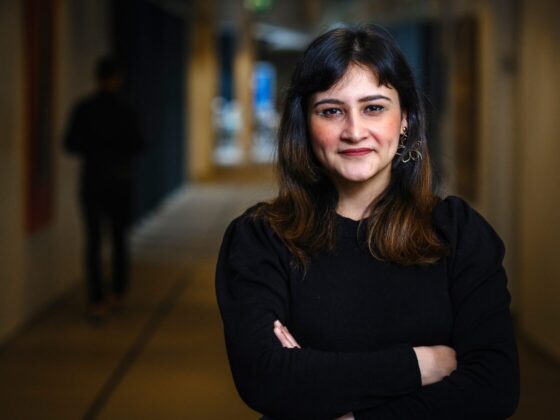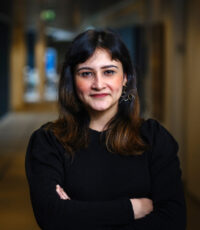News Details
Alumni Q&A | Ayesha Amin, MSSP’18

Authored by: Carson Easterly
Photography by: Provided
Alumni
07/25/25
SP2 alumna Ayesha Amin, MSSP’18, is a feminist activist, gender expert, and founder of Baithak – Challenging Taboos, a women-led grassroots organization advancing gender justice, sexual and reproductive health and rights, and climate justice across Pakistan. Since 2018, Baithak has impacted over 500,000 women and girls through community-driven initiatives that challenge stigma and advance intersectional feminist action across Pakistan. Under Amin’s leadership, the organization has pioneered national-level efforts including the Gender Inclusive Climate Action Toolkit, the Masculinity Manifesto, and the Feminist Wellbeing Institute. She also consults with global organizations on gender policy and advocacy, and she has been recognized by multiple national and international platforms for her leadership and impact at the grassroots. We reached out to her to learn more about her time at SP2 and the transformative work she’s leading.
Why did you choose SP2’s Master of Science in Social Policy (MSSP) program?
I studied business for six years and worked in the corporate sector for a while, but I never truly connected with the work. During my job, I used to consume all my leave to volunteer with different NGOs. I still remember being offered a promotion and being told by my manager that I had to choose; either fully commit to the corporate path or stop taking time off to volunteer. That moment made things clear to me: I didn’t want to stay in a career I wasn’t passionate about. I applied to switch my field and pursue a master’s in social sciences to transition into work that felt more aligned with my values. I chose Penn and SP2 because I wasn’t entirely sure what specific direction I wanted to take within the social sector, but I knew I needed strong grounding and exposure. SP2 stood out as a place where I could explore different pathways, build foundational knowledge, and learn from people doing meaningful work across fields.
When did you first know that you wanted to be involved in this kind of work? Why?
In 2013, during a semester exchange program in the United States, I attended a conference on sexual and reproductive health. It was the first time I had encountered the topic in that way, and it sparked something in me. At the time, I didn’t think of it as a career path. Years later, while pursuing my master’s at Penn, I revisited that interest through a research paper on women’s access to sexual and reproductive health in South Asia, with a focus on Pakistan. I found very little accessible data and had to rely mostly on anecdotal evidence. That gap stayed with me. When I returned home, I became more curious about what women and girls in my own context were experiencing. I started having informal conversations and later organized community discussions. I realized this wasn’t just an academic interest, but it was deeply personal. My own experiences of navigating bodily autonomy helped me connect more intimately with the stories I was hearing. That’s when I began to understand that this wasn’t something I wanted to do as a one-off project or even just as a job, it was something I wanted to dedicate myself to fully. It became a sustained commitment to change, and over time, it grew into what now feels like the true purpose of my life.
What did you like the most about your experience at SP2? What would you consider the key takeaways?
What I appreciated most about my experience at SP2 was the space it gave me to explore. I didn’t come in with a clear roadmap, but I was met with openness, flexibility, and the freedom to learn across disciplines. In almost every course, I chose a different topic to work on, from sexual and reproductive health and rights (SRHR) for women, to bonded labor in Pakistan, to women’s political participation trying to figure out what I felt most connected to. I had a lot of support in doing that, both from faculty and peers. I also remember struggling with academic writing in the beginning. I applied for the student mentor support program that was available, and that really helped me find more confidence in my writing and ideas. I also valued how many professors encouraged us to question systems, power structures, and our own positionality. One of the key takeaways for me was learning how to hold complexity to understand that social change doesn’t have a single path, and that meaningful work takes time, reflection, and openness.
What led you to your current position?
After returning to Pakistan after my master’s, what began as a personal inquiry into women’s access to SRHR evolved into a series of community conversations and focus groups in my hometown, Jamshoro. Over time, these informal spaces, referred to by women as baithaks (meaning gatherings of people) became safe spaces where women could talk, learn, and build collective understanding of their bodily autonomy. I kept doing this work while working full-time elsewhere, but it kept pulling me back. In 2023, I made the decision to leave my job and fully commit to what had already become a growing grassroots movement. That’s when I formally founded Baithak – a feminist, women-led, community-driven organization focused on gender and climate justice. My current position is a result of choosing to follow that work and let it take shape organically with the communities I am a part of.
What professional accomplishments have been most meaningful to you, and why?
One of the most meaningful accomplishments for me has been building Baithak from a series of informal community conversations into a grassroots feminist movement. What started as focus group discussions in my hometown grew into safe spaces for women and girls to talk about their rights, share experiences, and support one another across Pakistan. Seeing that organic transformation and knowing it came from trust, community connection, and listening means more to me than any formal title or recognition. Another milestone that stands out is when young girls and women who once participated in Baithak’s sessions began leading them. That shift from being participants to becoming facilitators and advocates was a powerful reminder that change doesn’t have to be top-down. It can be slow, collective, and rooted in everyday relationships.
What are you looking forward to in your career, and how do you think your SP2 experience has impacted your professional path?
I am looking forward to continuing to build work that challenges structural barriers particularly those that limit women and girls’ access to their rights, agency, and well-being. I envision change that isn’t just about services or programs but about shifting how power is held and who gets to make decisions in our communities. Whether it’s through feminist organizing, policy advocacy, or working directly with young people, I want to contribute to a world where care, justice, and dignity are centered. My time at SP2 shaped the way I think about systems and structures. It pushed me to ask harder questions not just about what needs to change, but how change happens, and for whom.
People
-

Ayesha Amin
Alum, MSSP Program
Contact